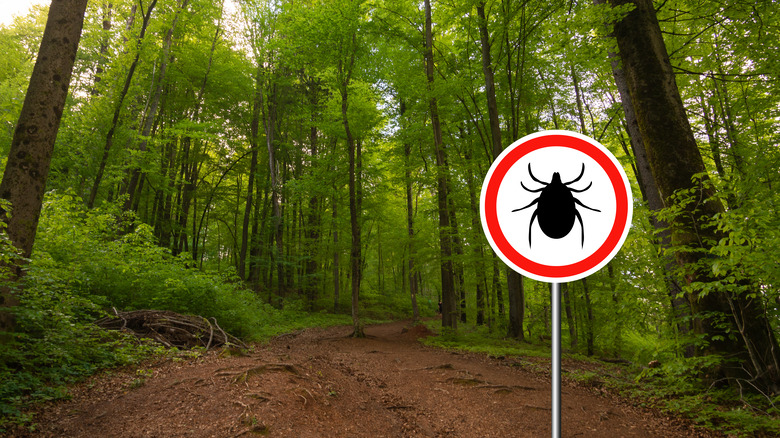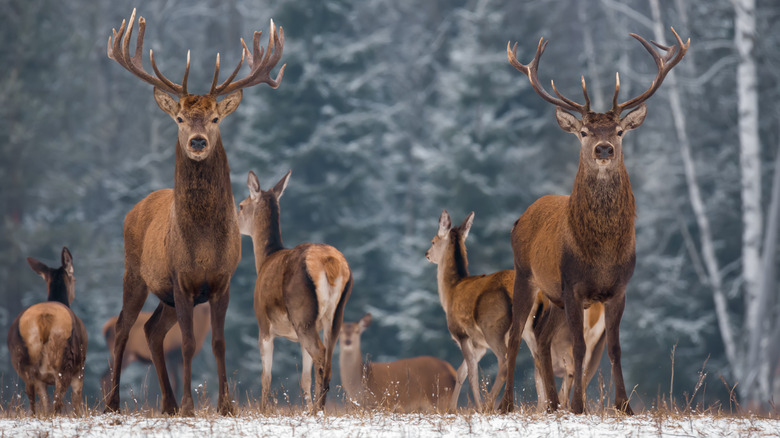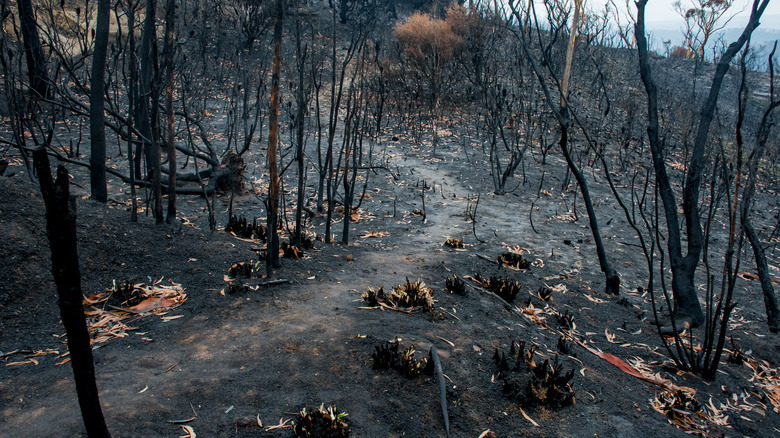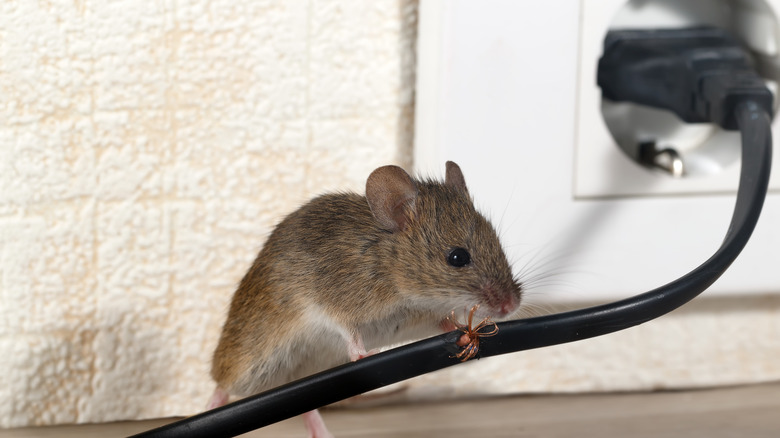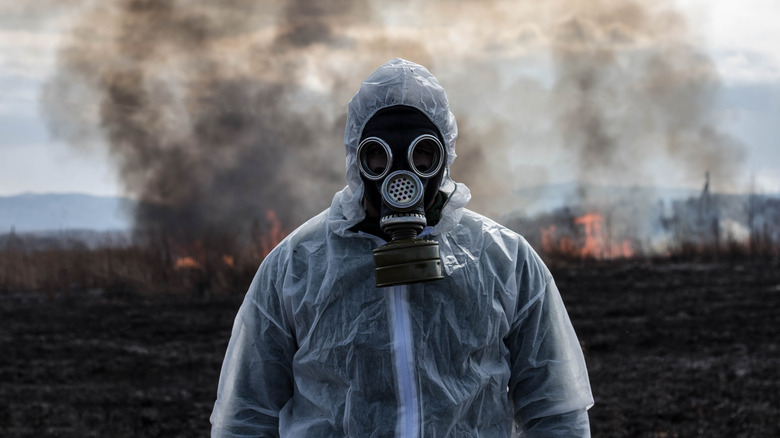Here's What Would Happen If Ticks Went Extinct
As autumn leaves change to bold, seasonal colors, many people are eager to start exploring the wilderness. Forest romps and campfire tales are in the air. As many venture out onto winding nature trails and clamber into hayrides to indulge in seasonal thrills, one of the few things that could put a damper on the atmosphere is parasites.
Yes, parasites. The blood-sucking kind, especially. We often think of them as being summer-oriented insect pests. However, according to Harvard Health Publishing, the ever-expanding climate crisis has expanded tick season, causing these blood-thirsty little guys to show up in the shoulder seasons of spring and fall. A world with more ticks could cause a spike in cases of Lyme disease, and leave you reaching for your repellent more often. It could mean more infectious toxins dwindling in the air, not to mention a creepy-crawly feeling that's enough to send chills up your spine.
But consider an alternate scenario that really bites — a world where no ticks exist at all.
In a world without ticks, there might be fewer diseases
In an article issued through PubMed and produced by author/researchers Jose de la Fuente, Agustin Estrada-Pena, Jose M. Venzal, Katherine M. Kocan, and Daniel E. Sonenshine, we learn that ticks are believed to be responsible for over 100,000 infectious diseases. In fact, when it comes to transmitting infections to humans, ticks are second only to mosquitoes.
A world where 100,000 infectious diseases suddenly stop spreading sounds amazing, right? This is particularly true when it is also an environment with one less blood-sucking, flesh-leeching pest on the loose. Live Science reports that a completely disease-free world could significantly reduce global poverty, creating abundance rather than overpopulation. There is a trade-off here, though, as hosting fewer diseases largely eliminates the possibility of death via natural selection, which could mean weaker human DNA for future generations. Ironically, that wouldn't matter much. In a world with little to no disease, stronger DNA strands would not be necessary to protect us. In other words, the prospect of fewer diseases is a good outcome for humans on an individual level but a more complex one when looking at humanity as a whole.
A world without ticks would most certainly be overrun by deer
If you don't want your dinner being strong-armed by ruminant mammals, you might want to think twice about eradicating ticks and the diseases that come with them. Fewer ticks and fewer diseases mean way more deer than anyone ever bargained for and that population expansion would come at a hefty price.
NBC News reports that the United States already exhibits a deer population problem, with the deer population increasing by more than 30 million in just over a hundred years' time. The deer might not be gobbling up humans, but they are "eating away at forests nationwide" and causing over a million car accidents annually.
While deer are generally considered non-aggressive animals, it is worth noting that their increased contact with humans has habituated some of them and rare attacks have occurred as a consequence (via Pikes Peak Courier). There has even been some rather disturbing footage showing a deer munching on human remains that emerged in 2017 (via The Independent).
In a world where deer reign, the forest cannot replenish itself
This is already happening on a small scale in places like New York where the deer population is dangerously dense. According to NBC News, western New York's Letchworth State Park cannot regenerate due to its overabundance of deer. If things continue at this rate, in 40 to 50 years' time, this 14,000-acre wood will cease to exist.
In a world without ticks, where deer rule the roost, forests would die all across the globe. To a certain extent, the deer population would go on to determine which animals would survive and which animals would go extinct in the scattered places where some forest life remained.
And that would really be the least of our problems. According to BBC, a sudden and massive loss of plant life and trees would throw the global climate completely off-kilter, likely causing heavy and frequent downpours. With fewer trees to stop the rain from tumbling into Earth's oceans and rivers, marine habitats could be destroyed. Coral reefs would smother. The Earth could very well rapidly become but a shell of itself.
Without ticks, those forests would have a severe mouse problem
While a world overrun with deer might still appear cute and cuddly, even amid dying forests and ruined oceans, the same cannot be said of mice. These rodents are notorious for their ability to reproduce against all odds. Pest World for Kids reports that a single mouse can produce roughly 35 babies each year. This is under regular conditions where ticks are around to infect these mice. Without ticks to bite the mice that scurry, the world would quickly become a rodent's paradise.
Remember earlier when it was mentioned that eliminating ticks "might" reduce disease? Well, this overabundance of mice is the variable that could swing the pendulum in either direction. Like ticks, mice also spread infectious diseases to humans, and in much more disgusting ways than just sucking your blood. According to American Pest Pros, mouse feces, urine, and saliva can contaminate everything from the surfaces we cook on to the very air that we breathe. In this hypothetical world without trees, that air would be in short supply, not to mention relatively toxic.
Even humans are vulnerable to extinction in a world without ticks
As you can see, we really do rely on these blood-sucking parasites known as ticks, even if we don't like them latching onto our flesh. Without ticks, the deer population explodes, killing our forests. The absence of trees, in turn, ruins our oceans which immediately are at risk of overflowing. The oceans, which guard our water supply, also house millions of maritime creatures. Many of them, approximately 25%, would go extinct in the absence of the vital coral reefs (via Reef-World Foundation).
After all of this comes the rodents to revive disease and wreak havoc on our cabinets and electrical wiring. Earth quickly becomes a planet producing harsh weather conditions and very little water- a planet where many animals by land and sea would fall prey to inevitable extinction. Such an environment would likely be too hostile for humanity to survive. At least we can find peace knowing that the deer would make light work of our remains.
